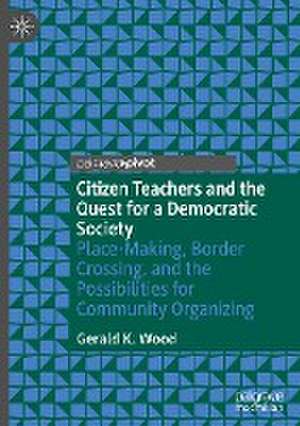Citizen Teachers and the Quest for a Democratic Society: Place-Making, Border Crossing, and the Possibilities for Community Organizing
Autor Gerald K. Wooden Limba Engleză Hardback – 28 oct 2022
Preț: 318.52 lei
Nou
Puncte Express: 478
Preț estimativ în valută:
60.95€ • 63.28$ • 50.83£
60.95€ • 63.28$ • 50.83£
Carte disponibilă
Livrare economică 01-15 martie
Livrare express 15-21 februarie pentru 27.19 lei
Preluare comenzi: 021 569.72.76
Specificații
ISBN-13: 9783031154638
ISBN-10: 3031154630
Pagini: 109
Ilustrații: XXIII, 109 p. 15 illus.
Dimensiuni: 148 x 210 x 15 mm
Greutate: 0.27 kg
Ediția:1st ed. 2022
Editura: Springer International Publishing
Colecția Palgrave Macmillan
Locul publicării:Cham, Switzerland
ISBN-10: 3031154630
Pagini: 109
Ilustrații: XXIII, 109 p. 15 illus.
Dimensiuni: 148 x 210 x 15 mm
Greutate: 0.27 kg
Ediția:1st ed. 2022
Editura: Springer International Publishing
Colecția Palgrave Macmillan
Locul publicării:Cham, Switzerland
Cuprins
Chapter 1. Citizen Teachers: Why Teachers Should Organize.- Chapter 2. Place Making and Border Crossings: Analyzing Space Using Critical Geographies of Education.- Chapter 3. The Power of Teacher Organizing.- Chapter 4. The Power of Parent Engagement.- Chapter 5. The Power of Student Organizing.- Chapter 6. Creating Free Spaces in Teacher Education.
Notă biografică
Gerald K. Wood is Associate Professor of Educational Foundations in the Department of Educational Leadership at Northern Arizona University, USA. His work focuses broadly on the intersections of critical geographies and community organizing. He has worked with Industrial Areas Foundations affiliates and has been involved in broad-based organizing and youth organizing work.
Textul de pe ultima copertă
"Wood's unflinching honesty on teaching is a beacon in a world rife with misinformation, capitalist exploitation, and a perpetual commitment to white supremacy. By lifting up the role of the citizen teacher, his challenge is clear: we cannot run from the problems of the world and hide in our classrooms. Instead, we must organize and build with those who know their oppression and work to abolish it permanently."
—David Stovall, Professor, Black Studies and Criminology, Law, and Justice, University of Illinois at Chicago, USA
"This is an exciting book that points the way forward for educators and all who care about transforming schools towards democracy, justice, and liberation. With a compelling vision, powerful stories, and practical guidance, it shows why and how teachers can become community organizers, creating equitable schools in deep partnership with families, students, and communities. Get this book, read it, and use it!"
—Mark R. Warren, Professor, University of Massachusetts Boston, USA, and author of Willful Defiance: The Movement to Dismantle the School-to-Prison Pipeline
—David Stovall, Professor, Black Studies and Criminology, Law, and Justice, University of Illinois at Chicago, USA
"This is an exciting book that points the way forward for educators and all who care about transforming schools towards democracy, justice, and liberation. With a compelling vision, powerful stories, and practical guidance, it shows why and how teachers can become community organizers, creating equitable schools in deep partnership with families, students, and communities. Get this book, read it, and use it!"
—Mark R. Warren, Professor, University of Massachusetts Boston, USA, and author of Willful Defiance: The Movement to Dismantle the School-to-Prison Pipeline
This book explores how citizen teachers can expand our capacities to generate more equitable and just spaces with families by working as community organizers. Paying particular attention to community organizing work in one elementary school, the book weaves stories and examples with theoretical understandings to support emerging citizen teachers in creating more democratic spaces. Each chapter provides key community organizing concepts and skills and offers lessons learned to identify what worked and what did not. By building solidarity with families, citizen teachers can effectively activate more powerful practices grounded in the lives of students, their families, and their communities while articulating a broader response to the conditions impactingeducators.
Gerald K. Wood is Associate Professor of Educational Foundations in the Department of Educational Leadership at Northern Arizona University, USA. His work focuses broadly on the intersections of critical geographies and community organizing. He has worked with Industrial Areas Foundations affiliates and has been involved in broad-based organizing and youth organizing work.
Caracteristici
Brings together theory, history, and specific practices/ tools around education organizing Provides historical examples of women educators/ activists during the Progressive Era Draws on Dewey’s notions of democracy in relationship to education
